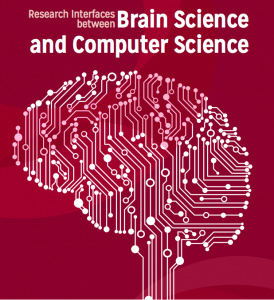 The following blog post was written by Dr. Martin Wiener, AAAS Fellow Directorate for Computer & Information Science & Engineering Division of Information and Intelligent Systems at the National Science Foundation (NSF).
The following blog post was written by Dr. Martin Wiener, AAAS Fellow Directorate for Computer & Information Science & Engineering Division of Information and Intelligent Systems at the National Science Foundation (NSF).
Comparisons of the brain to a computer have been around since Alan Turing first described the Automatic Computing Engine in 1936. However, decades of research have now shown that the brain is nothing like a computer; at least, nothing like one that currently exists. Plasticity, flexibility and redundancy in neural circuits have led us to understand that the human brain operates with greater efficiency than the most powerful supercomputers today. However, as the field of neuroscience advances, the field of computer science benefits; new strides in neuromorphic computing have come from neuroscientific insights. If the brain is not like a computer, can we build a computer that is like a brain?
This week, a group of prominent neuroscientists and computer scientists will meet in Washington, DC for a workshop, jointly organized by the Computing Community Consortium (CCC) and NSF on the interface between neural and computing sciences. The goal of this workshop will be to find common ground and establish new avenues of research, and in so doing establish a new frontier of scientific inquiry into neural and computing systems.
From the perspective of a neuroscientist, there is great promise in this workshop. Insights from computer science have led to advances in neuroscience that are currently being utilized in labs around the world. One example of this is in the field of machine learning, which has led to the advent of multi-voxel pattern analysis of fMRI data and pattern classification of EEG and electrophysiological recordings. From this work, neuroscientists can classify time-series data to identify the coding properties of neural populations. A second example is in the application of graph-theoretical analysis to functional and structural connectivity data, or “connectomes”, allowing for a nuanced understanding of the myriad connections found in neural circuitry.
A third example of how neuroscience and computer science can benefit one another is in the field of machine vision. Pattern recognition of objects is a tractable yet intensive operation for computers, but a relatively easy and fluid one for the brain. Recent discoveries about the structure of neural networks have given rise to neuromorphic chips that can more readily identify and classify objects with far lower power needs. A direct benefit of this advance for neuroscience is in the recognition and tracing of cellular morphology from electron micrography. In large-scale datasets, currently being generated, the tracing of individual neurons is a laborious process that would take hundreds of years to complete in even a fly brain. However, with neuromorphic computing and computer vision, the required time could be reduced by orders of magnitude. In this way, neuroscience has advanced computer science, which in turn feeds back onto neuroscience. Put another way: we must build a brain to understand one.
The plenary talks scheduled for the workshop provide an exciting image of the computational neuroscience frontier. Jack Gallant (UC Berkeley) will discuss the manifold benefits of a big data approach to neural datasets with machine learning algorithms. Aude Oliva (MIT) will discuss the limits of computer science, as bound by human perception and cognition. Leslie Valiant (Harvard) will speak on model validation for computational models of cortical processing. Terry Sejnowski (HHMI, UCSD) will lastly speak on the great endeavor to connect levels of analysis and approaches in neuroscience and the BRAIN initiative. All of these talks will be live-streamed, available for anyone to listen to. I encourage everyone interested in either neuroscience or computer science to listen.
As we continue to approach the daunting complexity of neural systems, one of the best ways we will advance is by gaining insights from computer science. I am excited at the prospects of the upcoming workshop, and look forward to learning what new insights can be gained from this joint venture.
Please join in on the conversation via twitter at #cccbrain.









